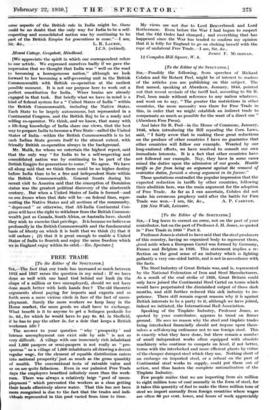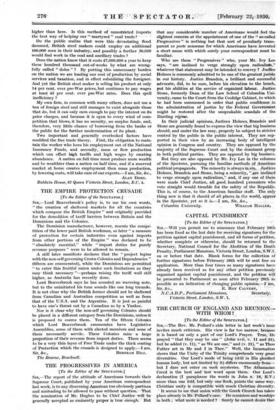[To the Editor of the SPECTATOR.] .
Sta,—I beg leave to correct an error, not on the part of your contributor, but on the part of Professor J. H. Jones, as quoted in" Free Trade in 1980 " Part 8.
Professor Jones is stated to have said that the steel producers of this country, having no organized body to represent them, stood aside when a European Cartel was formed by Germany, France and Belgium in 1926. This statement implies a re- flection on the good sense of an industry which is fighting gallantly a very one-sided battle, and is not in accordance with the facts.
The Steel Industry of Great Britain was, and is, represented by the National Federation of Iron and Steel Manufacturers. As a result of the coal strike of 1926, Great Britain could only have joined the Continental Steel Cartel on terms which would have perpetuated the diminished output of those dark months, and still further reduced this sick industry to im- potence. There still remain cogent reasons why it is against British interests to be a party to it, although we have joined, indeed we initiated, the International Rail Association.
Speaking of the Tinplate Industry, Professor Jones, as quoted by your contributor, appears to tread on firmer ground. He sees no reason why the steel and tinplate trades being interlocked financially should not impose upon them- selves a self-denying ordinance not to use foreign steel. This is exactly what they have done, but there remain a number of small independent works often equipped with obsolete machinery who continue to compete on level, if not better, terms with the interlocked and more efficient plants by virtue of the cheaper dumped steel which they use. Nothing short of an embargo on imported steel, or a refusal on the part of Continental steel works to supply, could put them out of action, and thus hasten the complete rationalization of the Tinplate Industry.
Few people realize that we are importing from six million to eight million tons of coal annually in the form of steel, for it takes this quantity of fuel to make the three million tons of steel we import annually from foreign countries where wages are often 60 per cent. lower, and hours of work appreciably
higher than here. Is this method of unrestricted imports the best way of -helping our ""martyred " coal trade?
Do the public realize that- were this devastating flood dammed,- British steel makers could employ an additional 100,000 men in their industry, and possibly a further 50,000 would find work in the coal and ancillary trades ? - Does the nation know that it costs £7,000,000 a year to keep these hundred thousand out-of-works by what are wrong- fully called " doles " ? By putting this unnecessary burden on the nation we are loading our cost of ProdUction by social services -and taxation, and in effect subsidizing the foreigner. And yet the British steel maker is selling his product at only 14 per cent. over pre-War prices, but continues to pay wages at least 45 per cent. over pre-War rates. Does this spell inefficiency ?
My own firm, in common with many others, does not use a ton of foreign steel and still manages to exist alongside those that do, but it can only earn enough to pay the interest on its prior charges, and because it is open to every wind of com- petition that blows, it has no security, no surplus funds, and, therefore, very little-chance of borrowing from the banks or the public for the further modernization of its plant.
Two important and generally overlooked factors have modified the free trade theory. First, the obligation to main- tain: the worker who loses his employment Out of the National Insurance Funds, and secondly, mass or, flow production which can offset high tariffs and high wages by creating abundance. A nation on full time must produce more wealth and be wealthier than a nation on half time, and if a reserved market at -home creates employment then mass production, by lowering costs, will take care of our exports.—I am, Sir, &c., ALAN DORE. Baldwin House, 67 Queen Victoria Street, London, E.C. 4.











































 Previous page
Previous page